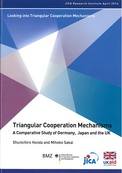Triangular Cooperation Mechanisms: A Comparative Study of Germany, Japan and the UK

While there is increasing recognition of the significance of “triangular cooperation (TrC)” as effective development cooperation approach, information is unfortunately still lacking at present on how TrC is planned and promoted by major bilateral donors. To fill this knowledge gap, the Organisation for Economic Co-operation and Development (OECD) undertook a series of activities from 2012 to 2013, including the publication of two analytical reports on the state of TrC by each donor. The results were discussed at the Policy Dialogue on Triangular Co-operation of the OECD Development Assistance Committee (DAC) held in Lisbon, Portugal in May 2013. This paper has been prepared as one of the follow-up activities of the Policy Dialogue. It briefly explains the mechanisms of TrC of the DAC members engaged in such cooperation. Three countries—Germany, Japan, and the UK—active in using TrC are selected as case studies in order to conduct a comparative analysis focusing on their planning, financing, and budgeting.
This paper, along with the one on Japan’s TrC mechanism, was shared among the concerned parties including donors and the governments of developing countries during the High-Level Meeting of the first Global Partnership for Effective Development Co-operation held in Mexico in April 2014.
scroll